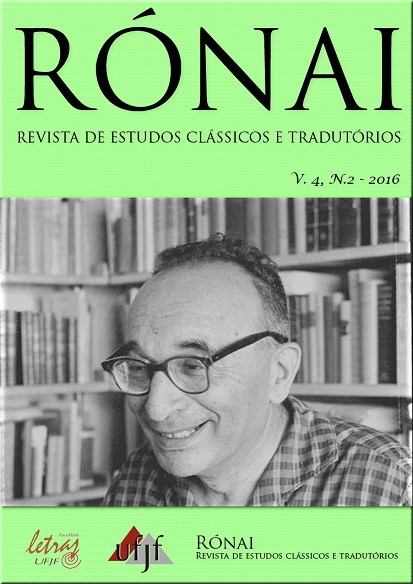Quaero e a expressão da volição
Palavras-chave:
morfossintaxe, Cícero, verbosResumo
Nosso objetivo é pesquisar se haveria usos de quaero que justificassem a expressão da volição através de seu sucessor morfofonológico “querer”. Para isso, analisaremos morfossintaticamente as ocorrências de quaero na obra de Cícero, Ad Atticum, a partir da teoria funcionalista, a fim de comparar essa pesquisa à análise sobre uolo. Pretendemos, assim, nas próximas etapas, traçar possíveis contextos frasais que teriam propiciado a competição entre esses verbos na expressão da volição e o apagamento de uolo, na passagem do latim para o português e para o espanhol.
Downloads
Referências
A GUITA JAÉ , José María. “La desaparición de uolo-uelle querer’ y su sustitución por quaero-quaerere buscar’ en gallego, portugués y castellano”. VERBA 2010, v. 37, p. 331-344.
A GUITA JAÉ , José María. “Acercamiento etimológico al cast. (gall.-port.) buscar: lat. poscere.”. Cuadernos de Filología Clásica. Estudios Latinos. 2007, 27, núm. 2. Pp. 197-216.
CÍCERO, M. T. Ad Atticum. Disponível em: http://www.thelatinlibrary.com.
CICERÓN. MÁRQUEZ, Pantoja; RODRÍGUEZ, Miguel. Cartas. I: Cartas a Ático (cartas 1-161). II: Cartas a Ático (Cartas 162-426). Introducción, traducción y notas. Editorial Gredos, S. A. Sánches Pacheco, 81, Madrid, 1996.
DELÉANI, Simone; VERMANDER, Jean Marie. Initiation a la langue latine et a son systeme. Manuel pour grands débutants I.
DIAS, Nilza Barrozo. Gramaticalização de Orações Matrizes. In: SEMINÁRIO DO GEL, 58., 2010, Programação. São Carlos (SP): GEL, 2010. Disponível em: <http://www.gel.org.br/>. Acesso em: 14.02.2014.
ERNOUT, A.; MEILLET, Antoine. Dictionnaire étymologique de la langue latine: histoire de mots. Paris: Klincksieck, 1951.
FARIA, Ernesto. Gramática Superior da Língua Latina. Rio de Janeiro: Livraria Acadêmica, 1958.
FURTADO DA CUNHA, M. A. O modelo das motivações competidoras no domínio funcional da negação. In: Revista Delta. São Paulo, v.17, n.1, 2001. Disponível em: <http://www.scielo.br/scielo.php> Acesso em 10 de agosto de 2010.
GABELENTZ, G. von der. Die Sprachwissenschaft. Ihre Aufgaben, Methoden, und bisherigen Ergebnisse. Leipzig: Weigel, 1891.
HELENA. SECO, Elena Pingarrón. Etimología de QUERER. Disponível em: <http://etimologias.dechile.net/?querer>.
HENDERSON, J. Pliny’s Letters: A Portrait of the Artist as a Figure of Style, Omnibus 4: 31–2, 1982.
HOPPER, P. J. & E. C. TRAUGOTT. Grammaticalization. Cambridge: Cambridge University Press, 1993.
MOURA, M.Z. Orações Matrizes [VERBO SER + PREDICATIVO]: predicados que expressam atitude do falante. Dissertação de mestrado. Juiz de Fora: Universidade Federal de Juiz de Fora, 2009. 148f.
NASCENTES, Antenor. Dicionário Etimológico Resumido. Instituto Nacional do Livro. Ministério da Educação e Cultura. 1966.
NEVES, Gonçalo. A história do verbo querer. Disponível em: https://ciberduvidas.iscte iul.pt/consultorio/perguntas/a-historia-do-verbo-querer/33157. Acesso em: 10 jan. 2016.
RUBIO FERNÁNDEZ, Lisardo et al. Nueva Gramática Latina. Madrid: Editorial Coloquio, 1985.
SARAIVA, F. R. dos Santos. Novíssimo dicionário latino-português. 12a ed. Rio de Janeiro: Livraria Garnier, 2006.
VASCONCELLOS, P. S. Sintaxe do período subordinado latino. São Paulo: Fap-Unifesp, 2013.
Downloads
Publicado
Como Citar
Edição
Seção
Licença
Copyright (c) 2017 Laís Lagreca de Carvalho

Este trabalho está licenciado sob uma licença Creative Commons Attribution 4.0 International License.
Direitos Autorais
Autores que publicam nesta revista concordam com os seguintes termos:
1. Autores e autoras mantém os direitos autorais e concedem à revista o direito de primeira publicação, sendo a publicação licenciada sob a Creative Commons Attribution License 4.0 Internacional.
2. Os autores e autoras têm permissão e são estimulados(as) a publicar e compartilhar o trabalho com reconhecimento da publicação inicial nesta revista.
3. Os autores e autoras dos trabalhos aprovados autorizam a revista a ceder o conteúdo de seus trabalhos, após sua publicação, para reprodução em indexadores de conteúdo, bibliotecas virtuais e similares.
Para mais informações sobre a Creative Commons Attribution 4.0 International License, acessar: https://creativecommons.org/licenses/by/4.0/
Isenção editorial
O conteúdo dos artigos publicados é de inteira e exclusiva responsabilidade de seus autores, não representando a posição oficial da Rónai - Revista de Estudos Clássicos e Literários ou do Faculdade de Letras da Universidade Federal de Juiz de Fora ou das instituições parceiras.



